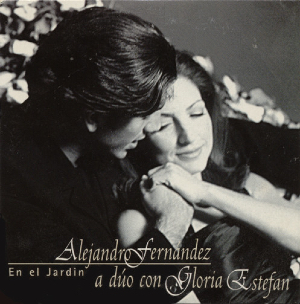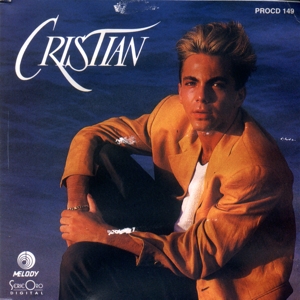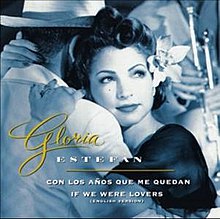
Gloria María Milagrosa Estefan is a Cuban-American singer, actress, and businesswoman. Estefan is an eight-time Grammy Award winner, a Presidential Medal of Freedom recipient, and has been named one of the Top 100 greatest artists of all time by both VH1 and Billboard. Estefan's record sales exceed 100 million worldwide, making her one of the best-selling female singers of all time. Many of Estefan's songs became international chart-topping hits, including "1-2-3", "Don't Wanna Lose You", "Coming Out of the Dark", "Turn the Beat Around", and "Heaven's What I Feel". Other hits include "Bad Boy", "Rhythm Is Gonna Get You", "Get On Your Feet", and "You'll Be Mine ".

"Hold Me, Thrill Me, Kiss Me" is a song written by Harry Noble and originally performed by Karen Chandler in 1952. It has been re-recorded several times since then, the most notable covers being by Mel Carter in 1965 and Gloria Estefan in 1994.

Benjamín "Chamín" Correa was a Mexican guitarist. He was renowned in the Spanish-speaking world for his traditional romantic music. Member of Los Tres Caballeros together with Roberto Cantoral and Leonel Gálvez from 1954. In 1957 they gained 4 golden discs for being the trio of major success on a global scale. He died in Cuernavaca, Morelos at the age of 90.

Mi Tierra is the third studio album by Cuban-American recording artist Gloria Estefan, released on June 22, 1993, by Epic Records. Produced by husband Emilio Estefan, it is a Spanish-language album and pays homage to her Cuban roots. The album features Cuban musical genres, including boleros, danzón and son music. Recorded at Crescent Moon Studios in Miami, Florida, Mi Tierra features notable Latin musicians such as Tito Puente, Arturo Sandoval, Cachao López, Chamin Correa and Paquito D'Rivera.

Greatest Hits Vol. II is the third English greatest hits album released by American singer Gloria Estefan, but is the fourth compilation and twenty-third album overall, released on February 6, 2001, by Epic Records.

90 Millas is the eleventh solo studio album by the Cuban-American singer-songwriter Gloria Estefan, and her fourth Spanish language album, coming after Mi Tierra, Abriendo Puertas and Alma Caribeña. It was released on September 17, 2007 by SonyBMG. All original material, the album contains a selection of various Cuban rhythms mixed with Latin-American contemporary pop.

"Cómo Me Duele Perderte" is a song by Cuban American singer Gloria Estefan from her ninth studio album, Alma Caribeña (2000). The song was written by Marco Flores with her husband Emilio Estefan and Roberto Blades handling its production. It was released as the album's second single by Epic Records on July 10, 2000. "Cómo Me Duele Perderte" is a salsa and bachata track that narrates the singer in pain of losing someone. The song was met with unfavorable reactions from music critics who criticized its arrangements and the singer's efforts. Commercially, the song topped the Billboard Hot Latin Songs and Tropical Airplay charts in the United States, while also peaking at number 12 on the Dance Club Songs chart in the same country and number eight in Spain. The accompanying music video was directed by Emilio, filmed in Miami, Florida, and features dramatic scenes of Estefan in front of a mirror remembering her former lover.

"En El Jardín" is a song written by Kike Santander and performed by Mexican recording artist Alejandro Fernández. It was co-produced by Santander and Emilio Estefan and features Cuban-American singer Gloria Estefan. It was released as the second single from Me Estoy Enamorando by Sony Music Mexico in 1997. The song is a pop ballad and portrays both singers falling in love, as if the love blossomed from a garden. A music video featuring both artists was made for the track.

"Mi Buen Amor" is a song by Cuban American singer Gloria Estefan from her third studio album Mi Tierra (1993). It was written by Estefano and the artist with her husband Emilio Estefan, Jorge Casas, and Clay Ostwald handling its production. It was released as the sixth single from the album in 1993 by Epic Records. It is a danzonete ballad, that according to a music journalist, speaks of a "romantic ode". Music critics gave it a positive reaction who found it delicate. Commercially, it topped the Billboard Hot Latin Songs chart in the United States. The accompanying music video features the artist in an empty ballroom. "Mi Buen Amor" was acknowledged as an award-winning song at the 1995 BMI Latin Awards.

"Tradición" ("Tradition") is a song by Cuban American singer and songwriter Gloria Estefan. It was released in 1993 as the third single from her first all Spanish-language album, Mi Tierra (1993). The song is heavily influenced by African and Cuban rhythms, and became the first song by Estefan to top the US Billboard Hot Dance Club Play chart, even though it was a Spanish language song. The single was released as a CD single and CD maxi, but some promotional singles were sent to clubs, the main reason why the song went to number-one on that chart for two weeks.

"Mi Tierra" is a song by Cuban American singer Gloria Estefan, from her third studio album of the same name (1993). It was written by Estefano and the artist, with her husband Emilio Estefan, Jorge Casas, and Clay Ostwald handling the production. The song was released as the lead single from the album in 1993 by Epic Records. It is a son montuno track in which the singer narrates longing for her homeland. The song received positive reactions from music critics, who praised its arrangement.

The discography of singles, promo singles, remixes and Latin tracks for Cuban-American singer Gloria Estefan and Miami Sound Machine consists of 50 singles and 24 promotional singles. Miami Sound Machine began releasing singles in 1977 and continued until 1989, when Estefan began being credited solely as a solo artist. Miami Sound Machine released a number of commercially successful singles through the late 1980s, including "Conga", "Dr. Beat", "Anything for You", and "Bad Boy". Although Miami Sound Machine was no longer featured in the credits of releases from 1989 onwards, they remain Estefan's backing group until this day, though none of the original members remain.

The 90 Millas World Tour is the seventh concert tour by singer and songwriter Gloria Estefan, the tour was performed primarily for her Spanish audience but also for the Dutch, Irish and British who have been her most ardent supporters.

The Live & Unwrapped is the fifth special concert by singer and songwriter Gloria Estefan, the tour was a special show made only to launch the album Unwrapped, the show was made at The Colosseum in Caesars Palace, Las Vegas.

"Nunca Voy a Olvidarte" is a song written by Roberto Belester and first recorded by Mexican grupero band Bronco for their album Salvaje y Tierno (1991). In the song, the protagonist is leaving and vows to never forget the time he spent with his lover. In 1993, Mexican singer-songwriter Cristian Castro covered the song on his album, Un Segundo en el Tiempo. Castro's version peaked at number-one on the Billboard Hot Latin Songs chart in the United States became his first number-one single.

Samuel Parra Cruz, known professionally as Samo, is a Mexican pop singer and songwriter, born and raised in Veracruz. Samo rose to fame in the late 2000s as a member of the band Camila.

Viva Tour (En Vivo) is the second live album by Mexican singer Thalía. It was released on November 12, 2013, by Sony Music Mexico in Mexico and was released in the United States on December 1, 2013, by Sony Music Latin and later on globally by Sony Music Entertainment. The album was released as a full concert on the following formats : CD + DVD, DVD and Blu-ray Disc. The DVD format includes also a behind-the-scenes documentary about Thalia's preparation for the tour. The concert was recorded on April 26 and 27, 2013 at the National Auditorium of Mexico City, during the tour's last concerts.
The 6th Lo Nuestro Awards ceremony, presented by the Univision, honored the best Latin music of 1993 and 1994 and took place on May 19, 1994, at a live presentation held at the James L. Knight Center in Miami, Florida. The ceremony was broadcast in the United States and Latin America by Univision.

"Si Tú Supieras" is a song written by Kike Santander and performed by Mexican recording artist Alejandro Fernández. It was co-produced by Santander and Emilio Estefan and was released as the first single from Me Estoy Enamorando by Sony Music Mexico on 18 August 1997. The song is a bolero-pop ballad with ranchera influences and portrays the singer yearning for his lover to know how much she means to him. A music video was made for the track and was used as the main theme for the Mexican telenovela María Isabel.
The 8th annual Billboard Latin Music Awards which honor the most popular albums, songs, and performers in Latin music took place in Miami.


















